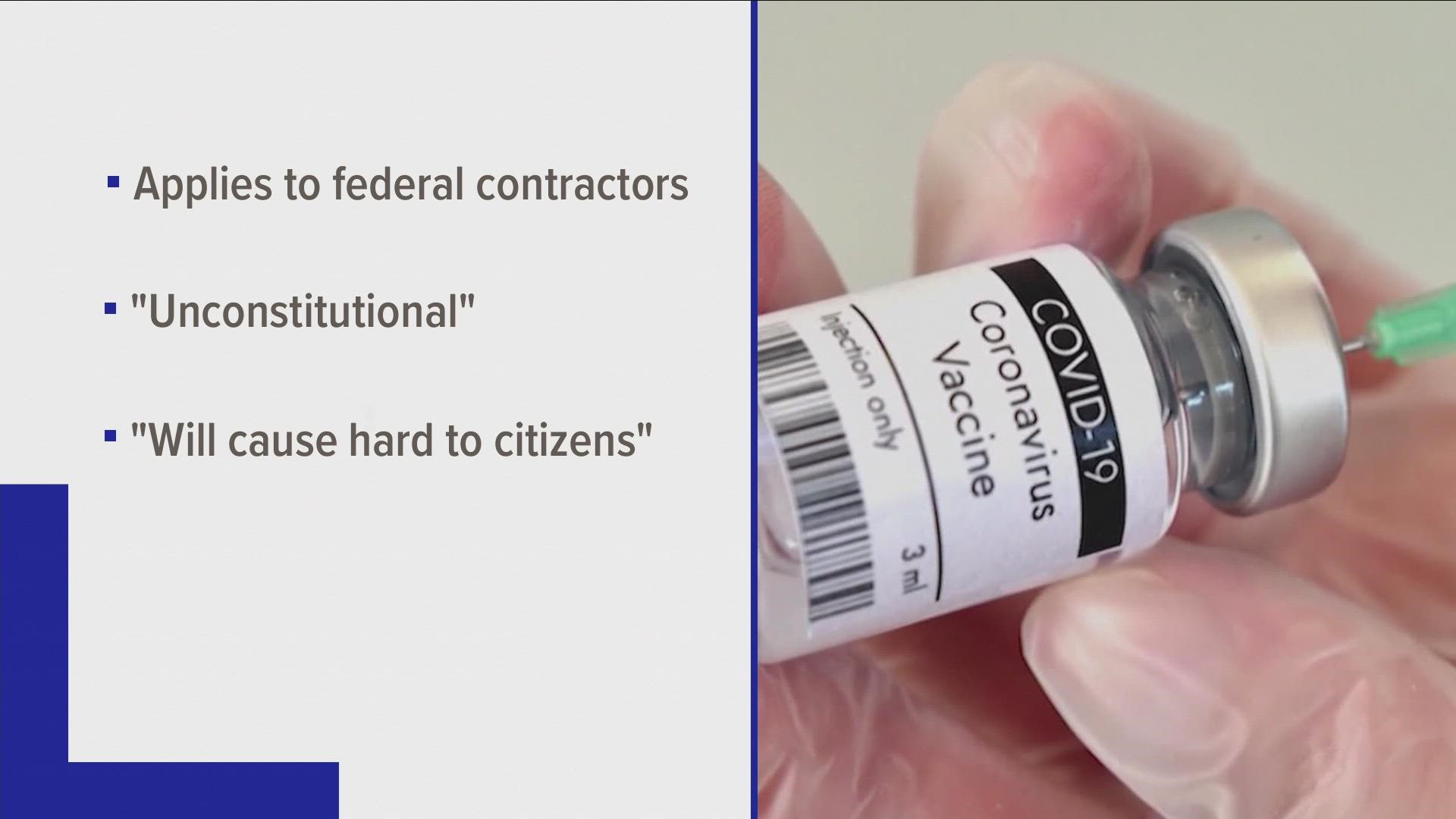KNOXVILLE, Tenn. — Tennessee's Attorney General announced the state is joining a lawsuit to sue President Joe Biden and several federal government agencies as COVID-19 vaccine deadlines loom for federal workers and contractors.
President Joe Biden's mandate requires federal employees to be fully vaccinated without a testing option by November 22, and federal contractors are required to be fully vaccinated by January 4. The deadline for contractors was pushed back from early December after companies brought up concerns about supply chain and air travel disruptions during the holiday season.
On Thursday, new OSHA rules went into effect under a new Emergency Temporary Standard for COVID-19 that require private companies with 100 or more employees to ensure staff are vaccinated against COVID-19 or are getting tested for the virus weekly, with a January 4 deadline to implement the measures in workplaces.
Healthcare workers will also be required to be vaccinated under rules issued by the Centers for Medicare and Medicaid Services for facilities that receive funding from government health programs.
Workers will be able to ask for exemptions on medical or religious grounds, though "accommodations" given to these workers have sometimes been limited unpaid leave, which has been the center of a lawsuit filed by employees against the federal contractor in charge of managing the Oak Ridge National Laboratory.
Shortly after the Thursday announcement, Tennessee Attorney General Herbert Slatery joined Kentucky's and Ohio's attorneys general in filing a joint lawsuit to block the measures from taking effect specifically for federal contractors in their states, at least temporarily until the lawsuit can be resolved. The lawsuit does not address the OSHA vaccine and testing rules for companies with 100-plus employees or healthcare workers.
The lawsuit was filed in the United States District Court for the Eastern District of Kentucky, claiming the Biden administration’s mandatory vaccination requirement for federal workers is unlawful and unconstitutional.
You can read the lawsuit at this link.
“The federal government contracts with private businesses and public agencies in states across the country, and the Commonwealth is no exception, meaning that numerous Kentuckians are subject to the Biden Administration’s unconstitutional vaccination requirement,” Kentucky Attorney General Daniel Cameron said.
The attorneys general argued the vaccine measures violate state sovereignty by preventing the states from exercising their police power to establish laws regarding workforce vaccination policies.
"The imposed mandates are unconstitutional because Congress did not articulate a clear principle by legislative act that directs the Executive to take sweeping action that infringes on state and individual rights,” the coalition writes.
There are 20 other states suing to stop Biden’s mandate on federal contractors in separate lawsuits.
In Tennessee, the OSHA vaccine ETS for private companies also technically applies to state and local government workers, because the state has a specific agreement with federal OSHA in the form of a state plan that was approved with OSHA in 1973 to operate its own plan through TOSHA to retain control over workplace safety regulations in all non-federal workplaces.
It is yet to be seen if TOSHA will adopt or enforce the new OSHA vaccine rules as it did with the previous OSHA COVID-19 ETS for healthcare workers. Despite efforts from state lawmakers to abandon COVID-19 measures, TOSHA's Commissioner Jeff McCord has stood firm on enforcing the previous OSHA COVID-19 ETS in state workplaces in order to ensure the state plan isn't jeopardized.
The state and TOSHA can still choose not to implement the new vaccine requirements in state and local government workplaces, but doing so would likely prompt the federal government to sever its long-held plan with the state for not meeting minimum requirements to ensure state workplace safety standards are similar to federal standards. McCord said that would place private workplaces across the state under federal oversight, which is the standard for most states across the U.S. that don't have state plans.
"It is increasingly important that TN-OSHA remain in full standing as a State Plan without inviting additional federal oversight, federal interpretation, and federal enforcement of safety and health standards in Tennessee," McCord wrote in a letter to Rep. John Ragan (R-Oak Ridge) prior to the October COVID-19 special session.

